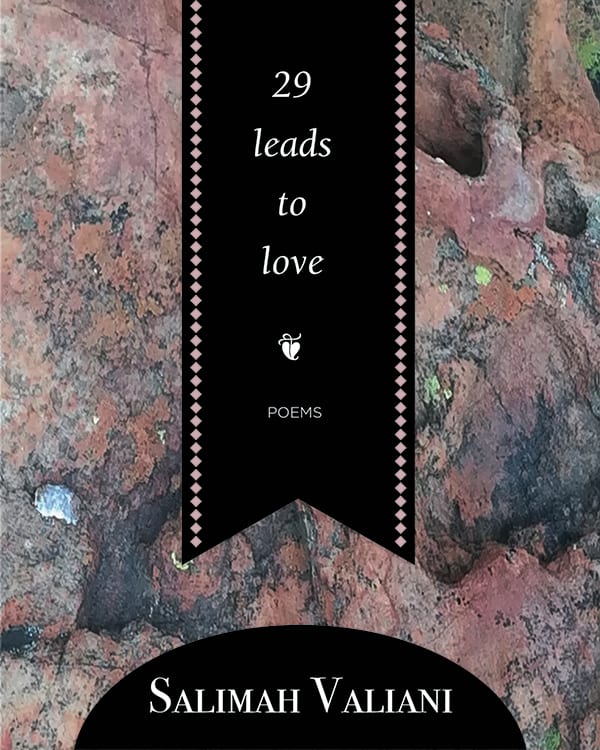Poet, activist, and researcher Salimah Valiani’s 29 leads to love is an exploration of relationships to the past, to place, and to the natural world.

It is primarily concerned with ecocide, which is defined by Oxford Languages as “the destruction of the natural environment by deliberate or negligent human action.” This focus is evident in the poet’s many meditations on the state of the environment and her connection to nature.
There are moments of beauty and calm that demonstrate a deep respect for the subject matter, such as in “On love (ii)” where Valiani writes, “the leaves were / to cheek / what wind was / to leaves.” Here, she writes of a soft caress from an innocuous moment communing with nature, or a “piece of peace / amid hectic city heaving” as she so aptly puts it. Similarly, in “On love (vi)” she describes “diamonds of sunlight touching water,” reverently capturing that magical, glittery quality of a setting sun across a lake or an ocean.
The collection is also concerned with our contemporary definition of love, challenging how narrow it can be. The 29 leads to love in question ponder all the different forms, facets and types of love that can exist in our world—whether it’s love for one’s community or heritage, or a love for honoring history accurately and for uplifting grassroots activists. Valiani writes of love found, love lost, love soured and rediscovered.
There is also a level of self-awareness that permeates the text. For instance, in “Conserve a Exposição,” the spacing between words and stanzas varies, drawing out the short lines and giving the poem a sense of movement across the page. What’s more, there is a line in the middle of the page that reads, “sculpture distanced from imperiousness.” This line feels particularly striking because of the so-called sculpted distance between words and letters within the very poem.
The poet references moments across space and time, bringing the reader everywhere from 1780s Mexico City, to the northern cape of South Africa, to a protest in Toronto. In some instances, she employs linguistic and cultural references without any further explanation, giving much credit to the reader and indeed encouraging them to take responsibility to engage with the text fully. In other poems, she invites the reader into the world she’s describing, using footnotes in poems like “Mexico City or, On love (vii),” to offer immediate context clues and enough explanation to appreciate the text at first read.
Indeed, the text is steeped with an understanding of history, and an implicit desire for others to think critically about the events that have led to the systems within which we operate today. For example, in “For the Eastern Ghats” she writes: “two houses or more make a village, the British said / to impose tax.” The way these lines are written is particularly heartbreaking because in that space between finishing the first line and reading the second one, at first one might think the poem is talking about finding strength in community amidst colonial oppression; but, the short stark punch of the following line about the ensuing taxation of this colonial arrangement emphasizes how so much of this world has been constructed to benefit the wealthy few.
Salimah Valiani’s 29 leads to love is rife with both abstract musings and specific callbacks, broadly reflecting on the ways we record and remember our relationships to culture, history, and the natural world.
Bios

Amelia Eqbal
Amelia Eqbal is a podcast producer and freelance writer based in Mississauga, ON. Passionate about theatre, sitcoms and all things pop culture, she can be found on Twitter @ameliaeqbal. [updated April 2023]

